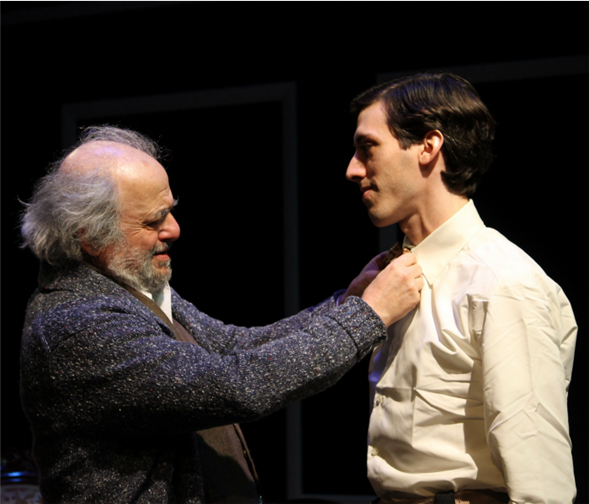Translate Page

Why New Yiddish Rep is mounting Clifford Odets' Depression-set drama
---
When New Yiddish Rep artistic director David Mandelbaum decided to produce Samuel Beckett's Waiting for Godot and Eugène Ionesco's Rhinoceros, he had to commission special Yiddish versions. But with Clifford Odets' 1935 classic Awake and Sing!, currently running at the 14th Street Y, he had three preexisting translations to choose from. "The one we're using is by Chaver Paver and was originally commissioned by the WPA Federal Theatre Project," Mandelbaum says, referring to the federal program that funded live performances during the Depression. But even though Awake and Sing! originally debuted on Broadway in English in a production mounted by the legendary Group Theatre, the play has always had strong Yiddish roots.
"Odets' original draft of the play was called I Got the Blues and there's a lot not only of Yiddish, but references to religious customs," Mandelbaum says. "[Group Theatre cofounder] Harold Clurman, under pressure from the actors it was written for, finally agreed to direct it, but it was sanitized. Boychik is the one Yiddish word that was left. But if you look at the syntax of the way Odets wrote it, it's very Yiddish. It's the way a Yiddish speaker who learned English would say it in many of the sentences he wrote."
Since
"I think Awake and Sing reflects a time when the country was in difficulty and people were questioning the values of our society," says Mandelbaum. "The same is happening right now. We're facing a moral crisis of values. I don't want to sound like a pundit on TV but theatre is a powerful, powerful tool, and I hope that this show resonates with people on that level."
Mandelbaum started New Yiddish Rep in 2007 after breaking with the century-old National Yiddish Theatre Folksbiene. "They do a particular thing: musicals and operettas," he says. "But there's a tremendous legacy of Yiddish drama." As such, New Yiddish Rep's repertoire has included Yiddish plays (notably last season's mounting of God of Vengeance, the inspiration for Paula Vogel's Tony-nominated Indecent); stage adaptations of Yiddish literature; and Yiddish translations of shows in other languages, all presented with English supertitles. Most of the performers are fluent in Yiddish. A few learned it as adults, but many grew up speaking the language. In fact, the company has attracted a number of Hasidic exiles, including Transparent star Luzer Twersky, who plays Hennie's schlemiel of a hubby; Eli Rosen, who portrays ineffectual patriarch Myron; and 24-year-old Moshe Lobel, who's making his professional stage debut as the disaffected son Ralph.
"I grew up Hasidic and I was at a point up to about a year ago where I hated the Yiddish language," says Lobel. "I thought it was designed to suppress intellectual thought, so Hasidim would not be using English or reading English literature. I thought it should end. I didn't understand why people were holding on to it. Then I came to see New Yiddish Rep's God of Vengeance and I found this beauty in the language I hadn't realized was there. The vocabulary opened up, it was poetic and it was beautiful. I decided I would love to explore this language further and I've fallen in love with it."
Mandelbaum, who's 70, is particularly glad to have connected with so many young off the derech Hasidim like Lobel, as he believes they are the future of Yiddish theatre in this country. "You know most of the great Jewish literary figures went through the same thing these young actors went through," he says. "They were brought up in religious homes and they broke away from it and created secular lives for themselves. If we don't find these people and encourage them and develop their talents, there will not be a vibrant, significant Yiddish theatre for very much longer. I'm a child of survivors and like everyone in my situation the question I constantly ask myself is, 'Why am I here? Why did my parents survive when so many people were lost?' I guess my answer is to make sure that the language and the culture that was almost totally destroyed has a shot at being more than just an academic pursuit or a tap-your-feet, snap-your-fingers expression of Eastern European music. And these young people that are in the company now, they make it worthwhile. That's why I'm still doing it. We've got a shot now at actually seeing what I think of as Yiddish theatre continuing for another generation."
---
Raven Snook is the Editor of TDF Stages. Follow her at @RavenSnook. Follow TDF at @TDFNYC.
Top image: David Mandelbaum and Moshe Lobel in Awake and Sing!. Photos by Pedro Hernandez.
TDF MEMBERS: Go here to browse our latest discounts for dance, theatre, and concerts.